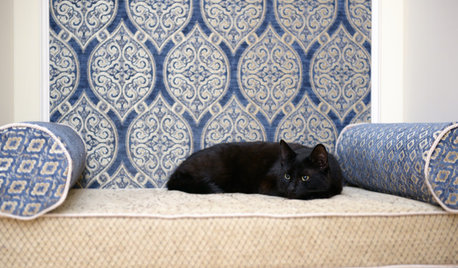Scar Treatments
thorndncr
17 years ago
Related Stories

HOUSEPLANTSMeet a Long-Lasting Houseplant With a Forgiving Heart
Low light and little watering won't scar Zee Zee plant for life; this East Africa native has a tolerant nature and an exotic beauty
Full Story
DECORATING GUIDESHow to Remove Wallpaper in 4 Steps
Learn the best way to remove wallpaper with only water (and elbow grease) so your next wall treatment will look great
Full Story
WALL TREATMENTSIs That Really Wallpaper?
Check out 10 of the best double-take, trompe l’oeil wallpapers — from fake paneling to tile effects
Full Story
DECORATING GUIDESBulletproof Decorating: Upholstery That Stands Up to Anything
Kids and pets are no match for fabrics as durable as these, which meet higher style standards than ever
Full Story
BUDGET DECORATING9 Tricks to Boost Your Home’s Appeal for Less Than $400
Whether you’re redecorating or just doing a quick update, check out these ways to enhance your home on a budget
Full Story
REMODELING GUIDESWhy Marble Might Be Wrong for Your Bathroom
You love its beauty and instant high-quality appeal, but bathroom marble has its drawbacks. Here's what to know before you buy
Full Story
MODERN HOMESHouzz Tour: Fieldstone Divides and Connects a Wisconsin Home
Modern architecture looks right at home on its site, thanks in part to a bold north-south wall of local stone
Full Story
KITCHEN DESIGNDream Spaces: 12 Beautiful White Kitchens
Snowy cabinets and walls speak to a certain elegance, while marble counters whisper of luxury
Full Story
PETS10 Tips for Keeping Indoor Cats Healthy and Happy
It's National Cat Day: Ask not what your cat can do for you (because it will ignore you) but what you can do for your cat
Full Story
KITCHEN DESIGN10 Ways to Design a Kitchen for Aging in Place
Design choices that prevent stooping, reaching and falling help keep the space safe and accessible as you get older
Full Story

lucy
rusty_blackhaw
Related Professionals
Surprise Landscape Architects & Landscape Designers · Erie Landscape Architects & Landscape Designers · Canton Landscape Contractors · Conroe Landscape Contractors · Lady Lake Landscape Contractors · Leicester Landscape Contractors · South Portland Landscape Contractors · Tewksbury Landscape Contractors · Woodbury Landscape Contractors · Glendale Heights Carpenters · Miami Springs Carpenters · Sunnyvale Carpenters · Charleston Roofing & Gutters · Cincinnati Roofing & Gutters · Franklin Roofing & Gutterslucy
rusty_blackhaw
thorndncrOriginal Author
thorndncrOriginal Author
lucy
chasling
rusty_blackhaw
leimei00
shelin
kaliaman
rusty_blackhaw